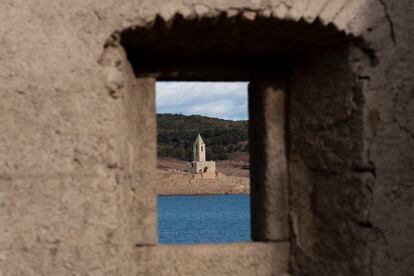The Barcelona City Council has announced this Tuesday the limitation of watering private gardens to two days a week, the emptying of almost half of public fountains and the reduction of water in municipal cleaning services.
These measures are part of the drought alert that the Generalitat has extended to the Catalan capital and its metropolitan area.
The Councilor for Climate Emergency, Eloy Badia, has assured that Barcelona households will not notice the limitations on a day-to-day basis but asks its citizens "not to lower their guard".
Nearly half (42%) of the city's ornamental fountains, which run on potable water, will be emptied.
For example, the one on Paseo de Gràcia, in the heart of the city.
Other emblematic ones, such as Montjuïc, will not experience supply cuts.
The sources of human consumption will be maintained.
Badia has highlighted the "maximum coordination" of the local Administration with the general plan of the Generalitat, which pursues the general reduction of 5% of consumption in "domestic, commercial, industrial and other recreational uses" through limitations on consumption of water per person per day, the decrease in drinking water in public services and the restrictions on agriculture, livestock and industry.
There are currently 550 municipalities throughout the Community affected by the restrictions after a dry year with little rainfall.
On how the City Council will control that citizens comply with the limitations, the councilor explained that it will be "the concessionaire company" (Aigües de Barcelona), which will notify the City Council in which addresses excess consumption may be occurring.
The councilor has indicated that the scenario to address this drought has changed since the last great drought in 2008 due to two main factors: "more resources and less consumption."
He has mentioned the water investments made since then through water treatment and desalination plants such as the one in El Prat, built in 2009. The councilor has also celebrated the "citizen attitude" that has reduced daily consumption per person by 14% since 2008 ( from 170 to 147 liters per person per day).
Therefore, despite these advances, the politician has lamented that this event reflects "the magnitude of climate change."
Despite this "greater awareness", the City Council requests several private savings measures from the public already included in the Government's drought decree: Private gardens will be irrigated a maximum of twice a week: Wednesday and Saturday (for households with an even number) and on Thursdays and Sundays (odd number).
Irrigation of public gardens will be carried out at night.
Pools without recirculation systems may not be filled, except for the first filling of newly built pools.
And those with this equipment will not be able to fill up completely.
The Consistory points out that it does not affect seawater pools without connection to public supply networks.
Outside of establishments dedicated to cleaning vehicles with "recirculating water systems" hoses may not be used, but bucket and sponge.
Detail of the Sau reservoir.
Gianluca Battista
The document also includes recommendations regarding individual savings such as showering "for five minutes instead of bathing" (which allows savings of 80%), purchasing low-consumption dishwashers or watering the plants also at night "to avoid evaporation". .
The cleaning of streets and other public spaces will be carried out "with the minimum consumption of essential water and avoiding, when possible, the use of drinking water".
The councilor of Barcelona en Comú, has highlighted that the water used by municipal services has been reduced by 11% and that the use of groundwater, obtained from the city's subsoil, has increased by 51% in these tasks.
The network of this alternative water resource in the city, which cannot be mixed with drinking water pipes, currently reaches 100 kilometers of pipes.
Badia pointed out that the last major investment, in Glòries, has managed to increase the cubic hectometres obtained by a third: "from 1 to 1.5".
Sources from the Catalan Water Agency (ACA), the community's highest management body in this matter, explain that the situation is likely to become more complicated in the face of next spring.
If it doesn't rain enough in winter, farmers run the risk of facing the irrigation season (which starts in June) with a practically empty canteen.
Irrigation consumes 70% of water resources, according to UNESCO.
You can follow EL PAÍS Catalunya on
and
, or sign up here to receive
our weekly newsletter

